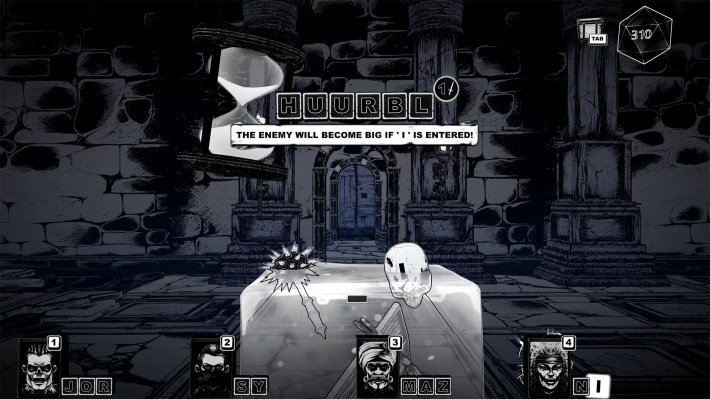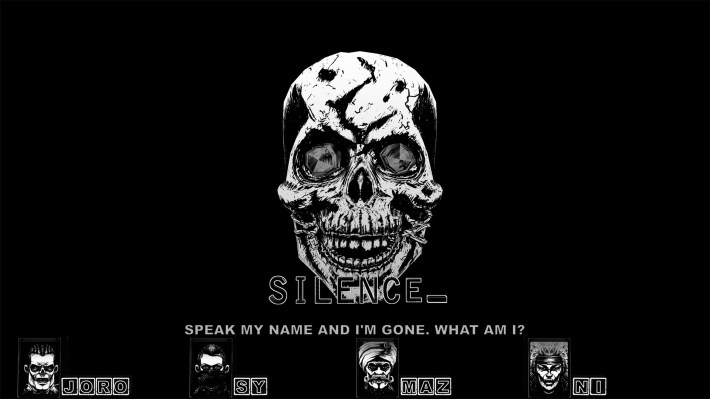Cryptmaster came out back in May, when Chris Person told me it was pretty good, but for various reasons I only got to it over the holiday. It is indeed pretty good! It’s a dungeon-crawling typing game with a strong personality and a ton of unique things to do. Sometimes that can feel like too many things, but luckily, all those things are really fun.
You control a team of four undead heroes, each with their own archetype: warrior, thief, bard, and sea witch. Guided by the titular Cryptmaster, a floating head who makes a delightful narrator, you travel through different underground towns and their surrounding swamps and caves to try to make your way to the surface, where the Cryptmaster wants to unleash the undead hordes on the world. Along the way, you help out other characters, solve a lot of word puzzles, and fight a lot of guys.
The combat is typing-based: your characters have cards with letters next to their names, and as you fill those letters in (we’ll get to how you do that in a second) you spell words that unlock powers. Joro, the warrior, has moves like “hit” and “boot” that damage or kick enemies away. Nix, as a sea witch, can unleash damage-dealing rains of crabs, fish, and other aquatic life. Characters can also boost each other’s damage, reset each other’s cooldowns, or heal each other. Most combat words cost “souls” to use, meaning if you’re not careful, you can end up only able to use the basic free attacks.
I’ll be honest that combat got a bit out of hand for me. There’s a lot of words to use, and many of them aren’t ones that come readily to mind in a fight (see: “fjord”). I tended to default to the same handful of words, which saw me through most early fights with ease but started to falter in the late game, when I found myself taking too much damage or running out of souls. There’s a lot of things you can do in a fight if you prioritize unlocking as many words as possible, but at the same time, combat can fall into a repetitive trading of blows. It gets mixed up somewhat: Some enemies have armor that can only be broken with a specific word, or can’t be damaged by certain letters, or can only be damaged by certain letters. But these additions never fully rescued combat from sometimes feeling like a grind.

Some fights can be avoided by detouring around enemies, which you’ll want to do anyway to unlock new moves, as well as your characters’ memories. You do this through finding letters in a variety of word-based activities you encounter around the map. One of the main ways is finding chests; inside the chests are objects the Cryptmaster has forgotten the name of. You discover what they are through a version of 20 Questions in which you ask the Cryptmaster to do things like “recall,” feel,” “taste,” and “describe.” You then guess the object, and if you guess right, you’ll get the letters in its name.
Similarly, you find skulls around the world that ask you riddles, which can also give you letters if you solve them. I found these activities way more fun than the combat; they’re clever and playful, occasionally tough, and a real love of language shines through them.
This love of language is what most stands out to me in Cryptmaster. It’s not a game where you have to avoid typos or write as fast as possible, or where typing is simply a stand-in for a regular button press. Everywhere in the game there are fun things to do with words: a character whom you help write a song, the Cryptmaster’s wry commentary, a spelling-based card game called “Whatever” that you play against other characters. You save your game at altars by defiling them, typing any sort of naughty word you want. Your souls are replenished by typing the names of fantasy bugs and fish. You open doors by guessing their codes. The penultimate level requires some brain-twisting word games to progress. The game’s black-and-white world might be a bit sparse, but all this spelling and guessing and wordplay makes it feel full.

That fullness doesn’t always work in the game’s favor. I sometimes felt like there was too much to do; I barely explored the potion-making mechanic, or the items for sale at various merchants. The need for souls meant I was often tediously hunting for bugs and fish, and the memories and lore fragments you unlock sometimes felt like too much information. When the game throws plot-moving activities into the mix, all this language, though delightful, can also get overwhelming.
But these dings are products of exuberance. Cryptmaster feels so in love with its core idea, so eager to show you all the different things you can do with words, that wishing it did a little less feels like not wanting to play fetch with an excited puppy. Overall, it’s a completely charming game, showing off its creativity and giving you tons of space to add your own. I’m glad I finally got to it.


